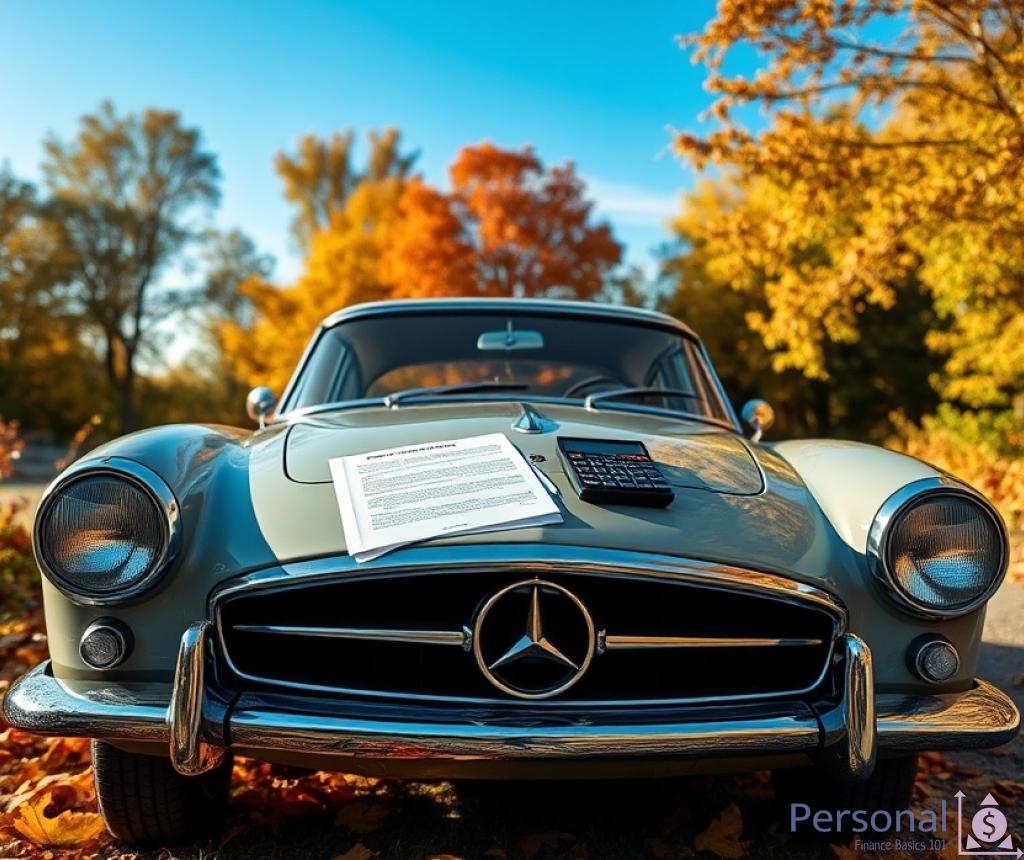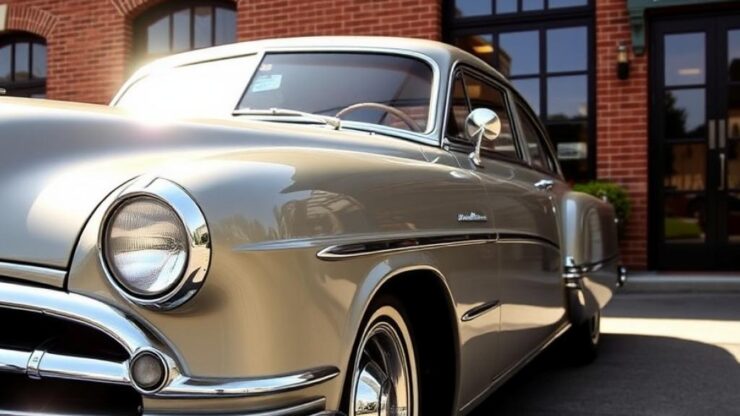Understanding Classic Car Insurance Policies

Classic car insurance is tailored specifically for vintage vehicles, offering coverage options that standard auto insurance policies often overlook. If you own a classic car, you understand that it is not just a mode of transportation but a cherished investment that requires protection. Unlike regular cars, classic cars often appreciate in value over time, making it crucial to have a policy that reflects their unique needs.
When considering classic car insurance, it’s important to understand the features that distinguish it from standard auto insurance. Policies typically offer specialized coverage options that cater to the specific usage, value, and restoration of vintage vehicles. Below is a comparison of some essential features:
- Agreed Value Coverage: Unlike standard market value policies, classic car insurance often includes agreed value coverage, meaning the insurance company agrees on the car’s value at the time of policy inception.
- Limited Mileage Options: Many classic car policies come with limited mileage plans, which lower premiums for cars that are not driven regularly.
- Roadside Assistance: Specialized roadside assistance tailored for classic cars is often included, ensuring that you receive the right help in case of an emergency.
- Restoration Coverage: Policies may offer coverage for restoration costs, ensuring that you can restore your vehicle to its former glory in case of damage.
Selecting the right classic car insurance policy requires careful consideration of several factors to ensure that your vintage vehicle is adequately protected. Here are some critical aspects to keep in mind:
- Type of Vehicle: The make, model, and year of your classic car can significantly influence the insurance policy terms and premiums.
- Usage: Determine how often you plan to use your classic car. Policies can vary based on whether the vehicle is for leisure, shows, or daily driving.
- Storage Conditions: Insurers may consider where you store the vehicle, with secure garages often resulting in lower premiums.
- Policy Limits: Review the maximum coverage limits and ensure they align with the potential value of your vehicle.
Evaluating Coverage Options for Vintage Vehicles
When it comes to classic car insurance, understanding your coverage needs is paramount. Every vintage vehicle comes with its unique history and value, which necessitates a tailored approach to insurance. As you embark on this evaluation journey, it’s essential to keep in mind the specific requirements that differentiate classic cars from standard vehicles. These requirements include the vehicle’s condition, its market value, and how you intend to use it. Take the time to assess each of these factors to ensure your vehicle is adequately protected.
One of the most crucial aspects of evaluating coverage options involves determining the agreed value of your classic car. This value is not only a reflection of the car’s current worth but also a safeguard against depreciation. Unlike regular vehicles, classic cars may appreciate over time, making it vital to have a policy that reflects this unique aspect.
As you sift through various insurance policies, be sure to pay attention to the key components of coverage. A comprehensive classic car insurance policy typically covers more than just liability; it encompasses various elements specific to vintage vehicles. For instance, policies may include restoration coverage, which helps offset costs associated with repairs or enhancements to your classic ride. This is particularly important as many owners engage in restoration projects to maintain or increase their vehicle’s value.
Additionally, consider the mileage restrictions that come with many classic car insurance policies. If you plan to drive your vehicle sparingly, options with limited mileage can offer lower premiums while still maintaining adequate coverage. This is an excellent way to protect your investment without overspending on unnecessary coverage. Furthermore, specialized roadside assistance can provide peace of mind during those rare outings, ensuring that help is just a call away, especially when dealing with the intricacies of vintage vehicles.
| Coverage Component | Description |
|---|---|
| Agreed Value Coverage | A pre-determined value agreed upon by the insurer and the owner, protecting against depreciation. |
| Restoration Coverage | Coverage for costs related to restoring your vehicle post-damage, ensuring it retains its value. |
| Limited Mileage Plans | Discounted premiums for vehicles driven infrequently, tailored for classic car owners. |
| Specialized Roadside Assistance | Tailored roadside help for classic cars, focusing on their unique needs. |
In summary, evaluating coverage options for vintage vehicles is an intricate process that requires a keen understanding of your car’s value and your personal needs as an owner. By focusing on essential components such as agreed value, restoration coverage, and specialized services, you can find an insurance policy that not only protects your investment but also enhances your overall ownership experience.
The Importance of Appraisals in Classic Car Insurance
In the realm of classic car insurance, appraisals play a pivotal role in ensuring that your vintage vehicle is accurately valued and adequately protected. Unlike standard vehicles, classic cars are often cherished not only for their aesthetic and engineering prowess but also for their investment potential. Therefore, obtaining a precise appraisal can significantly influence the level of coverage and the financial security of your prized possession.
Understanding the Role of Appraisals in classic car insurance is essential for every owner. An appraisal is a detailed evaluation conducted by a qualified expert who assesses the vehicle’s condition, rarity, and historical significance. This assessment culminates in an agreed value, which is crucial for establishing the basis for your insurance policy. It is important to note that an accurate appraisal can safeguard against potential disputes with insurers in the event of a loss, ensuring that you receive fair compensation that reflects the true worth of your vehicle.
Moreover, the appraisal process goes beyond just determining a monetary value; it also provides an opportunity for owners to understand the unique features and potential appreciation of their classic cars. By engaging with appraisers, owners can gain insights into the current market trends, which further empowers them to make informed decisions about their insurance coverage.
Regular Appraisals: A Necessity for Classic Car Owners cannot be overstated. The classic car market is dynamic, with values fluctuating based on trends and demand. Therefore, periodic appraisals are recommended to ensure that your insurance policy remains up-to-date and reflective of your vehicle’s current value. This proactive approach not only protects your investment but also aligns your policy with any enhancements or restorations that may have been undertaken since the last appraisal.
When selecting an insurance policy, it is imperative to communicate the importance of the appraisal to your insurer. Many specialized classic car insurance providers may offer discounts or incentives for vehicles that are appraised regularly, which can help in reducing overall insurance costs while ensuring comprehensive coverage. As an owner, understanding this relationship between appraisals and insurance can enhance your overall experience and protection.
Common Exclusions in Classic Car Insurance Plans
While classic car insurance is designed to provide tailored coverage for vintage vehicles, it is equally important for owners to be aware of the common exclusions that may exist within these policies. Understanding these exclusions is crucial for safeguarding your investment and ensuring that you are not caught off guard when you need coverage the most. Knowing what is typically not covered can help you make informed decisions about additional protections or supplemental policies that may be necessary.
One of the most frequent exclusions in classic car insurance plans pertains to daily driving usage. Many insurers stipulate that classic cars are intended for recreational use, and if you exceed the defined mileage limits or use the vehicle as a primary mode of transportation, coverage may be compromised. It is essential for classic car owners to carefully read the terms of their policy to ensure that their driving habits align with the coverage specifications.
Additionally, modifications and aftermarket parts can also fall under the umbrella of exclusions. If you have made significant changes to your classic vehicle, such as installing a non-original engine or custom bodywork, these enhancements may not be covered without specific endorsements. Insurers often require documentation and pre-approval for alterations, so it’s vital to consult with your insurance provider before undertaking any modifications to ensure that your coverage remains intact.
Another critical exclusion to consider is wear and tear. While classic car insurance typically covers damages resulting from accidents or theft, it may not cover issues that arise from the natural deterioration of the vehicle over time. Owners should be proactive in maintaining their classic cars and keep thorough maintenance records to demonstrate the vehicle’s condition in the event of a claim. Regular appraisals can also help in documenting the car’s value and condition, ensuring that you are in a better position to negotiate with insurers if needed.
In conclusion, while classic car insurance provides specialized coverage for vintage vehicles, it is essential for owners to understand common exclusions that may apply. Being informed about limitations regarding daily use, modifications, and wear and tear can significantly enhance your ownership experience, allowing you to take proactive measures to protect your investment. Always engage in open dialogue with your insurance provider, ensuring that your policy meets your unique needs and adequately protects your cherished classic car.
Tips for Finding the Right Classic Car Insurance Provider
Navigating the world of classic car insurance can be a daunting task, especially for those who are passionate about their vintage vehicles. The right insurance provider not only safeguards your investment but also ensures that you receive specialized coverage tailored to your unique needs. With so many options available, it is essential to approach this process thoughtfully. Here are some expert strategies to help you in your search for the perfect classic car insurance provider.
When searching for a classic car insurance provider, it is vital to assess their expertise in the niche market of classic vehicles. Unlike standard auto insurers, specialized providers possess in-depth knowledge of the intricacies involved in insuring vintage cars. Look for companies that have established a solid reputation within the classic car community. Consumer reviews, testimonials, and recommendations from fellow collectors can provide valuable insights into the reliability and service quality of potential insurers. Engaging with online forums and classic car clubs is an effective way to gather information and build a list of insurance providers that are recognized for their expertise.
As you explore different insurance policies, pay close attention to the specific coverage options that each provider offers. A comprehensive policy should align with the unique characteristics of your classic car, including its value, usage, and restoration plans. Ensure that the insurer provides agreed value coverage, which protects you against depreciation and guarantees a payout reflective of your vehicle’s worth. Additionally, inquire about the flexibility of the policy in accommodating future modifications or enhancements to your car. The ability to tailor coverage to your evolving needs is a significant advantage that can enhance your overall experience as a classic car owner.
Furthermore, assess the provider’s commitment to customer service. A responsive team that understands the nuances of classic car insurance can make a substantial difference, especially when navigating claims or policy adjustments. Establishing open communication with your insurance agent can foster a trusting relationship, ensuring that you have a reliable point of contact when needed. By prioritizing these factors, you can select an insurance provider that not only protects your investment but also offers peace of mind as you enjoy your classic vehicle.
Disclaimer
This article has been created or edited with the support of artificial intelligence and is for informational purposes only. The information provided should not be considered investment advice. Please seek the support of a professional advisor before making any investment decisions.






